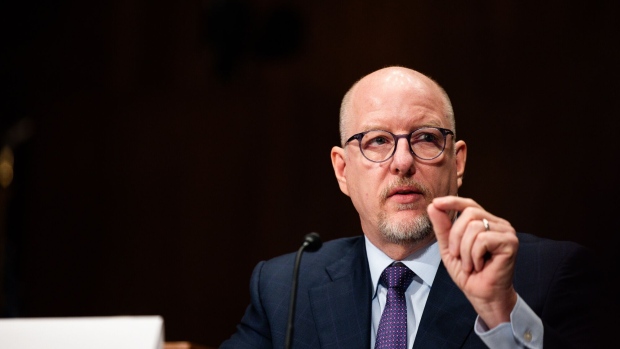Mar 26, 2024
Merck Drug for Rare Form of High Blood Pressure Gets US Nod
, Bloomberg News

(Bloomberg) -- Merck & Co. won US approval for a new treatment for a rare, dangerous form of high blood pressure that’s expected to be among the company’s hits as sales from successful older drugs begin fading later this decade.
The drug, known as sotatercept, will be sold as Winrevair in the US, according to information posted on the Food and Drug Administration website. It will cost $14,000 per vial and will be taken every three weeks, according to Merck. At that rate, the drug would cost about $242,000 a year, although some patients will require more.
The clearance is crucial to Merck’s efforts to bolster its pipeline of treatments for heart and metabolic disorders while preparing for bestseller Keytruda to lose market exclusivity toward the end of the decade. Revenue from the cancer drug reached $25 billion last year, more than 40% of Merck’s overall.
Winrevair is expected to help fill the gap. Some 40,000 Americans have pulmonary arterial hypertension, a dangerous increase in blood pressure in the lungs that’s most common in the elderly, women and Black people. While there are a number of therapies, some patients don’t respond fully to them, and Winrevair is approved to be used alongside.
“This is not incremental,” Carlos Santos-Gallego, a cardiologist at the Icahn School of Medicine at Mount Sinai, said in an interview. “This is potentially a groundbreaking therapy for PAH.”
Merck shares rose 4.6% at 9:50 a.m. in New York on Wednesday after gaining 15% this year through Tuesday’s close. Liquidia Corp., which makes an inhaled PAH therapy, lost 4.1%. United Therapeutics Corp., which also makes treatments for PAH, dropped 3.7%.
‘Clean & Consistent’
Doctors said Merck’s drug has the potential to change their approach to treating PAH, and the company is running studies to assess the drug’s usefulness in more people with the disorder.
“The label looks clean & consistent,” Jefferies analysts said, noting that it had no warning for severe side effects or safety monitoring program that might impede sales.
Jefferies raised its estimated peak annual sales to $11 billion, up from $7.5 billion. But if patients’ duration of treatment increases, and the drug’s use is expanded to new categories of PAH, annual revenues could approach $15 billion, the Jefferies analysts said in a note. That would account for about half of Merck’s impending sales losses when its exclusive rights to Keytruda lapse, according to the note.
Merck has not given specific sales estimates, but Chief Executive Officer Rob Davis said it’s likely to be a multibillion dollar drug.
Importantly, the drug was approved for self-administration, meaning patients can take it at home rather than going to a doctor’s office every few weeks. “You want these to be convenient,” said Evan Seigerman, managing director of biotech and pharma equity research at BMO Capital Markets.
Winrevair is the first new treatment for PAH in almost a decade. Merck acquired it in the $11 billion acquisition of Acceleron Pharma — one of the first deals Davis struck after taking the CEO role in 2021.
“This is an important proof point of the strategy that we have been following over the past few years,” he said in an interview. Merck has its “broadest and deepest pipeline” in years, positioning it for success well into the next decade, Davis said.
Patients who got a shot of Winrevair every three weeks in a late-stage trial increased the distance they were able to walk in six minutes — a measure of heart and lung function — by more than 30 meters (98 feet). There was almost no increase over the 24-week study among those who got a placebo, and all the patients were on two to three other medications at the time.
The results, published in the New England Journal of Medicine last year, were “almost unheard of” in tests of PAH patients, Icahn’s Santos-Gallego said. The FDA granted Merck’s drug priority review in September.
Research has linked PAH to abnormal growth in affected blood vessels, leading to constriction and blockage. Merck’s drug interferes with cell-growth signals in the tissue, which may enable doctors to treat the cause of the disease.
Long-Term Growth
“This is the first drug that’s shown potential to be disease modifying opposed to just treating the symptoms,” Davis said. It could potentially benefit an even broader patient population down the line, he said.
The most common side effects are headache, rash, diarrhea and widened blood vessels in the skin called telangiectasias or spider veins, according to the FDA. There is also an increased risk of bleeding for some patients, the agency said.
In trials, the most common side effects were low platelet levels and increased hemoglobin, both of which can be monitored, Santos-Gallego said. Overall, side effects were higher among patients getting a placebo than those on Merck’s drug. A study of the drug’s long-term use is underway.
Winrevair is also subject to a licensing agreement with Bristol Myers Squibb Co., which gave the company exclusive rights to develop and commercialize it outside of the pulmonary hypertension field.
--With assistance from Robert Langreth and Bill Haubert.
(Updates with share move in sixth paragraph.)
©2024 Bloomberg L.P.





